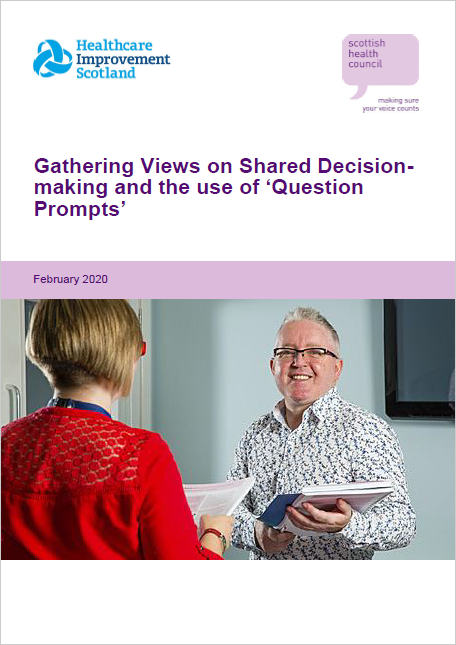Shared decision-making and enabling people to make informed decisions about their care based on what matters most to them is a priority across NHS Scotland.
The Chief Medical Officer's 2016-17 annual report, Practising Realistic Medicine, described 'question prompts' as an effective and inexpensive way to support patients to become more involved in medical consultations. The 'prompts' are written questions that are given to patients in advance of their appointment which they can ask healthcare professionals.
We have carried out a number of pieces of work on Realistic Medicine on behalf of the Chief Medical Officer. In August 2017, the second survey of the Citizens' Panel asked participants about shared decision-making. We gathered views on what Realistic Medicine meant to patients and members of the public in July 2018. Most recently, in autumn 2018, we commissioned a Citizens' Jury which made 13 recommendations on how shared decision-making could be made a reality.
In response to the first recommendation of the Citizens' Jury, the Scottish Government asked us to hold discussion groups and individual interviews with members of the public to ask how they felt about the use of 'question prompts'. We shared with participants some examples of 'question prompts' and asked them for their views. We also asked them what would encourage people to use the questions during medical consultations.
During October 2019, we heard from a total of 81 people in 11 focus groups and 3 one-to-one interviews. Discussions took place in Ayrshire and Arran, Fife, Forth Valley, Grampian, Highland, Lothian, and the Western Isles and involved a diverse group of individuals in terms of age, gender and socio-economic backgrounds, and from urban and rural locations.
This report summarises what people told us. Most people supported the use of 'question prompts' and were able to identify and understand the benefits to both patients and healthcare professionals. A number of key themes emerged:
- The lack of time available for 'question prompts' to be used and the need to extend appointment times if they were to be successful in practice.
- The need for a comprehensive approach to ensure that all healthcare professionals, from consultants to GPs, pharmacists to reception staff, were included in the use of 'question prompts'.
- The need for 'question prompts' (if introduced) to be widely publicised and promoted to ensure everyone is aware of their right to ask and what healthcare professionals can expect to be asked.
- Effective and clear communication is required to break down barriers and ensure there is a meaningful discussion between patients and healthcare professionals.
- The inclusion of carers and supporters in conversations with healthcare professionals should be supported and promoted widely.
We would like to thank everyone who shared their experiences with us.
Impact
We shared all the feedback we received with the Scottish Government. The information gathered through this work will be used alongside other evidence collected on shared decision-making, and will inform a workshop for policy and clinical leads on the next steps in promoting the use of 'question prompts'. This will include decisions about potential national branding and marketing.
We will liaise with the Scottish Government in order to provide feedback to participants about how the views expressed in this report have been used.

